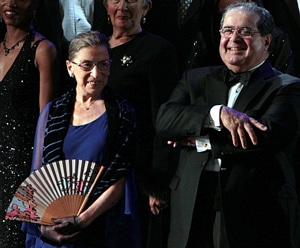
Note: This article first appeared in a now defunct website at the time of Scalia’s death
The late Supreme Court Justice Antonin Scalia is being praised as a conservative icon, brilliant writer, and all around great guy. Also included in the obits are descriptions of his friendship with his fellow justice Ruth Bader Ginsburg. This friendship went well beyond mere collegiality. In fact, they saw each other socially quite frequently, partied together, and took vacations together.
During a joint appearance with the woman he also has called his “best buddy” on the bench, Scalia said, “Why don’t you call us the odd couple?”
“What’s not to like?” Scalia joked at an event hosted by the Smithsonian Associates. “Except her views on the law, of course.”
So, here’s the problem: These two justices disagreed on virtually everything, from abortion and gun control, to gay marriage, capital punishment, and Obamacare. He was a devout Catholic, and she is a secular Jew. Surely, one can be cordial and professional with a person who holds opposite views on essentially every major political, social, and cultural issue—but why go out of your way to hang out with such an individual?
What would Scalia have to suppress to preferentially spend lots of time with Ginsburg? Would YOU choose to socialize with someone who disagrees with you on so much, even if you both might like the same classical music?
And, then it came to me. For all his brilliant opinions, and all of his conservative bona fides, Antonin Scalia must have viewed being a Supreme Court justice as his day job, and whatever passion he put into his writings was strictly vocational. What incredible emotional detachment! (If that’s what it really was.)
You hear all the time about doctors and homicide detectives who “don’t get emotionally involved” with the death and destruction around them. However, nine times out of ten, that is just pure bravado. And for that amazing one out of ten, he doesn’t get emotionally involved because he can’t. He’s seen too much, and he is now but an empty shell.
We wonder then, was Scalia truly able to separate work from his personal life, or was he truly an empty shell, posing as a happy Renaissance Man? Where did he hide the passion for his legal theories after hours?